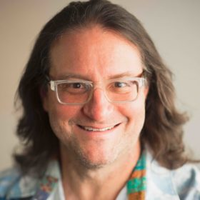Monday, December 17, 2018
Brad Feld On Startups Philanthropy, and Helping Teachers Succeed

Brad Feld is one of the most successful early stage technology investors in Colorado, through his investments as part of Foundry Group, his own personal investments, as well as through TechStars. He's also an avid builder of technology communities and author of Startup Communities, and co-author of one of the go-to books of the venture community, Venture Deals. His work, along with his partners at Foundry and Techstars, have helped to create what is now the major startup hub that is Boulder today. Brad and his wife, Amy Batchelor, announced this season they're matching donations to all of the Colorado first time DonorsChoose.org projects through the end of the year. We thought we'd catch up with Brad to understand why they decided on the match, his philosophy on how startup entrepreneurs should engage with philanthropy early, and why it's important for those in the tech startup world to be engaged with their local community.
Why did you decide to match all of these projects this year?

Brad Feld: There's a couple of reasons. My wife Amy Batchelor and I have been longtime donors and supporters on DonorsChoose, and one of the things I do when I have a shitty day, is I go online and match donors and projects. I'll punch in some search terms, and a bunch of teachers in Lexington, Kentucky will randomly get their project funded by someone they've never heard of before. It's one of the things I've been supporting for a long time, and it's something that is important to me. One of the cliché and simple reasons is that education is incredibly important to everything we do in this country, and it's massively underfunded and neglected in a lot of ways. It's been an incredibly difficult time for teachers, especially for projects that don't fit the narrow guidelines you typically see in education. One of the brilliances of DonorsChoose, is that you can contribute directly to teachers in a way that improves their classrooms, rather than something very generic and high-level. It's a very high impact type of giving. The teacher gets to buy stuff that exactly is what they need, and donors get to choose projects they want to support. So, it's the combination of the importance of public education, the importance of education in general, the under funding of education, and through the use of DonorsChoose the ability for donors to choose what teachers actually want.
When did you create the Anchor Point Foundation?
Brad Feld: We've had it for a long time. We actually started giving away money philanthropically in the early 90's, well before we had any meaningful resources. It's always been a part of our relationship, and part of our approach to life. Over the years, we not only increased the dollar amount and the percentage of our assets that we contribute philanthropically. We have always been quiet about but not uncomfortable about being public about it, and have used it to demonstrate leadership among our peers. We wanted to get people beyond thinking that philanthropy is something you do when you are old, or something you wait to think about until when you have a huge outcome. We believe it should just be a part of your life, all the way through. It's incredibly rewarding to contribute not just functionally, but financially to organizations, at all stages of your life. Anchor Point's activity has been around for a number of years, but we finally put up a website last year, because there was enough activity that we'd done across enough things, so we decided to put it in one place.
You mention Jared Polis influencing your efforts in helping the K-12 area. I know you and Jared have a long personal history. As some people might know, he was also a technology entrepreneur before engaging in politics. Do you think the tech community should be more engaged in politics?
Brad Feld: I have mixed thoughts on the specifics there, because it really depends on the individual. I have known Jared since I moved to Boulder in 1995. We've been friends since the. He's an extraordinary entrepreneur, and has built many successful businesses. But, from the beginning, he's really been interested in politics. The path he's gone on, in terms of making that his focus completely is consistent to where he was in his 20's, and where he has wanted to go. I think the tech community needs to engage with politics thoughtfully, rather than having the relationship be a directive one. One of the mistakes I see a lot of people making, who have seen some success in business and technology, is they think they know all the answers. Especially, if they now have success and resources, they decide they want everything look like they want it to look. I don't subscribe to that world view. Using Jared as an example, as I've watched his own evolution from where he was when he was first elected to Congress, to where he is today, is how well he's listened to his constituents in Colorado. He crosses a couple of different demographics, for example, Larimer and Boulder are completely different, and if you look at it, he's synthesized what he's seen from his position, and been able to think about things that incorporate all of his constituents and understanding what they really want. In politics, you can't be dogmatic on “this is how the world works”. I think that's one of the reasons Governor Hickenlooper has been very strong, because he's been able to take lots of input, and synthesize them in a powerful way. I think when the tech community engages with politics, it needs to be ain a broad context, rather than about what's good for me.
How can startup entrepreneurs spend any time on philanthropy, in the world where they have to be focused 24/7 on that startup?
Brad Feld: It's hugely important for startup founders, because many of the things that benefit startups and startup founders, is the health of the community there are part of. Said different, any Colorado startup benefits from the health of Colorado, and startups that are based in Boulder benefit from Boulder being a healthy place. Not just in a physical or financial way, but in terms of culture, intellect, academics, arts, and the whole spectrum of the community. If you go back in time, in 2007, Ryan Martens, the founder and CTO of Rally Software and I started The Entrepreneurs Foundation of Colorado, EFCO. Seth Levine provided the leadership there, and we supported seth on the growth of EFCO, which became Pledge 1%. Colorado was the start of an international version, a way for startup founders and startups to contribute their equity early, and do something that is philanthropic, and build that into the muscle of the business. The idea was inspired by what other entrepreneurs were doing, most notably, Marc Benioff with the Salesforce Foundation, and the philophy around philanthropy at Salesforce. Pledge 1%, which was started a decade ago, has now put something like six to seven million back into Boulder, philanthropically, which if you think about it is a remarkable amount of money for startups to have given to the community, independent of the personal philantrophic effort of founders and companies. It's also amazing given that includes many companies who weren't successful. If you look at that, and see how we're weaving that culture into companies in Boulder or Colorado more broadly, you can see that very powerful things happen when you recognize and support the idea that as a founder and entrepreneur, there's lot of value you gain from your community. It doesn't enforce that it the only way to be philanthropic, but it create a framework and frame-of-reference for entrepreneurial companies and founders to engage. I think that's really satisfying for entrepreneurs and investors, and there are very powerful things that can play over a long period of time for any ecosystem or community.
Thanks, and happy holidays!